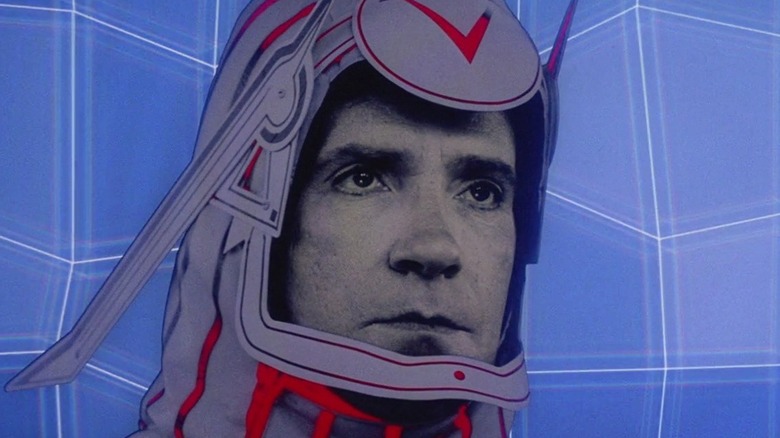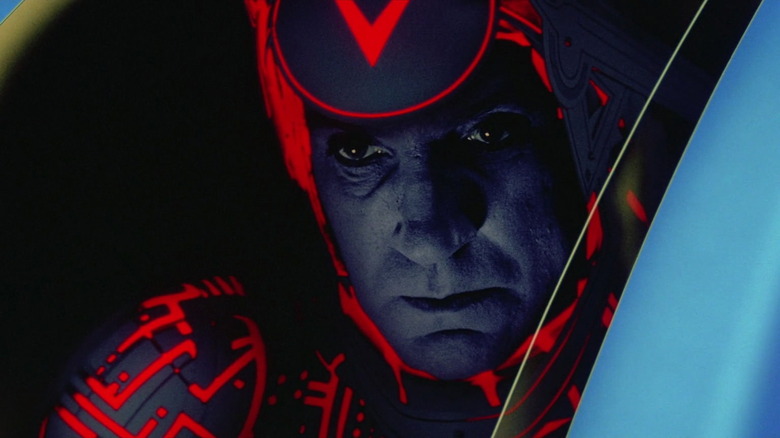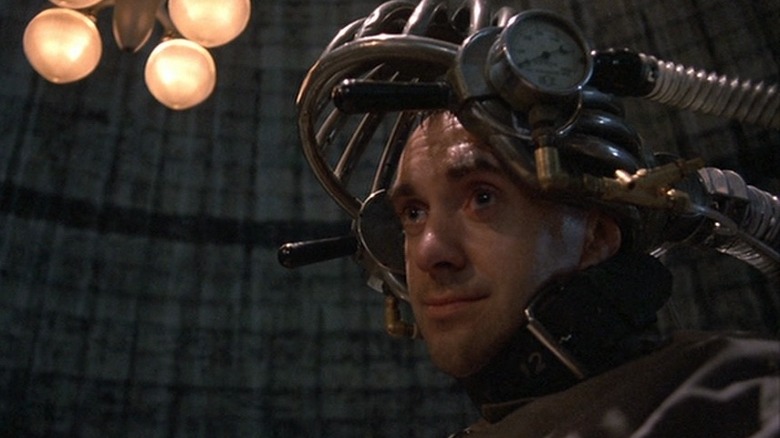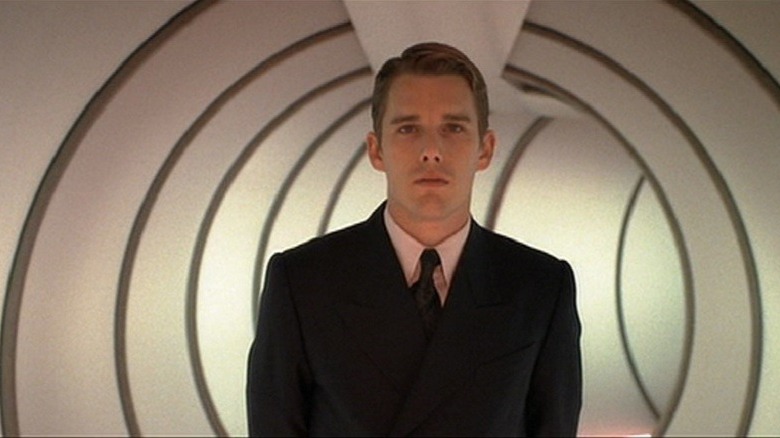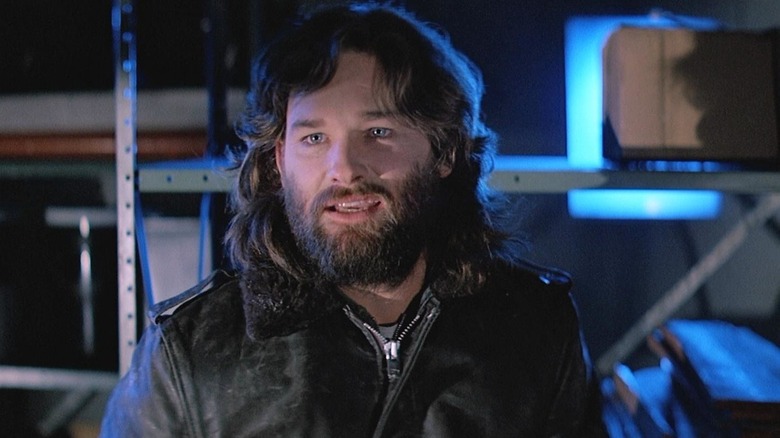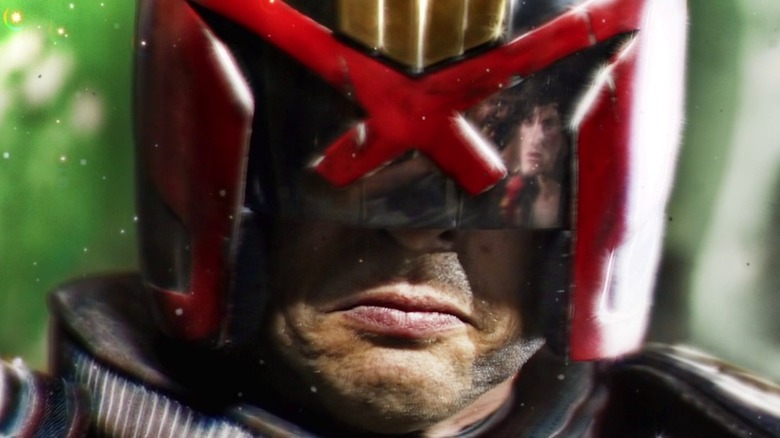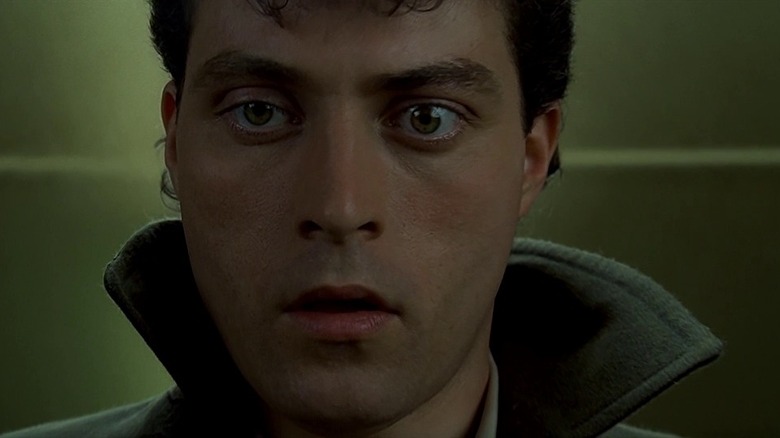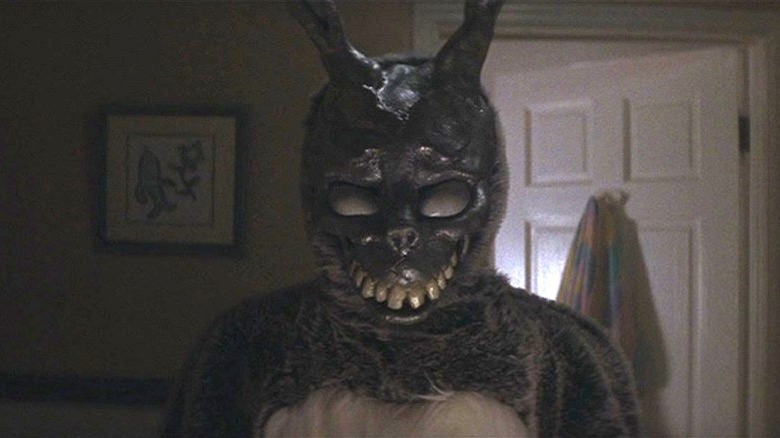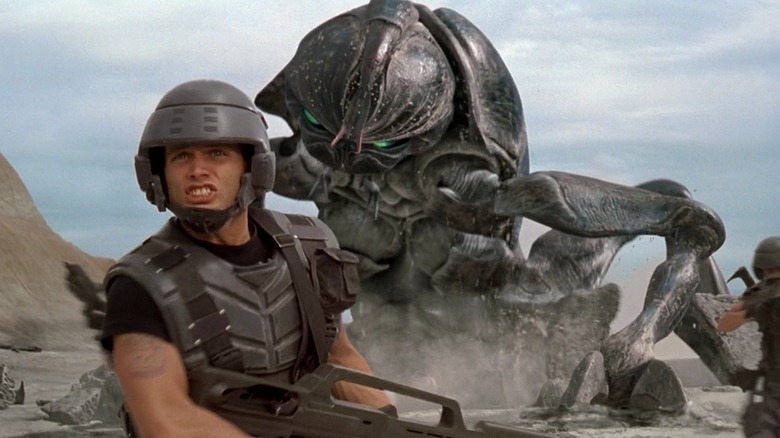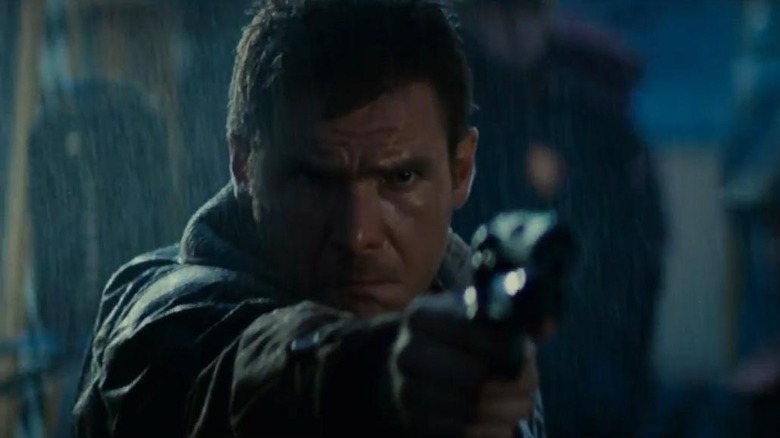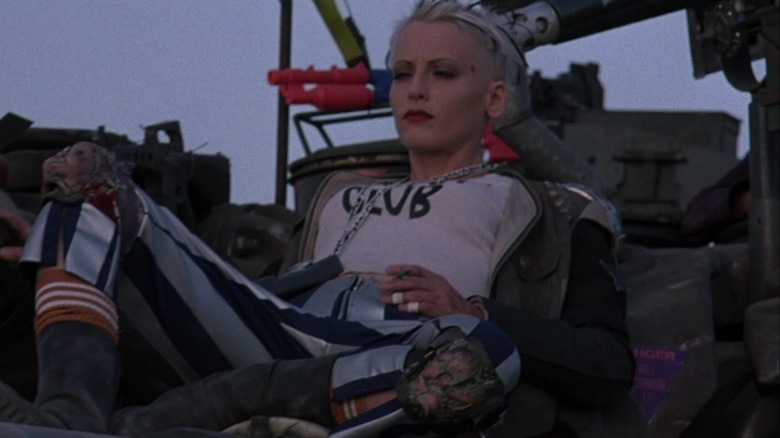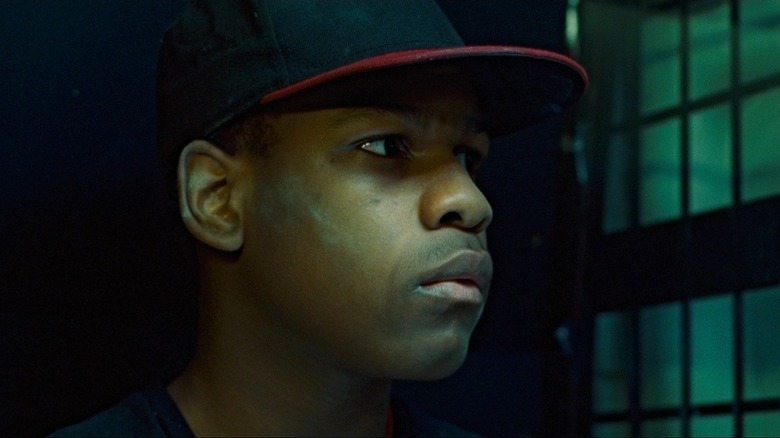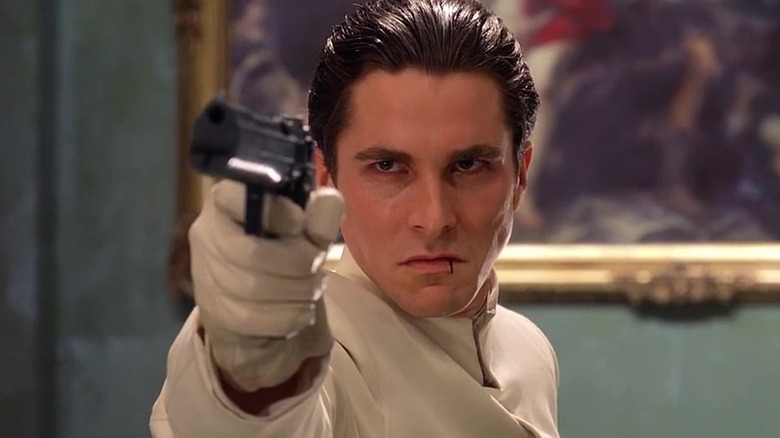Sci-Fi Films That Bombed At The Box Office But Still Became Cult Classics
First popularized in the '50s — when many cinemagoers' eyes were collectively pointed towards the stars — science fiction has remained a consistently popular genre for decades. Some of the most iconic franchises of all time — such as "Star Trek" and "Star Wars" — have captured the imagination of generations, and are just a few examples of stories in a genre as vast and unique as the galaxies in which they are set.
While the genre is undeniably popular with audiences, of course not every sci-fi film can be a hit. There are those that dominate at the box office, but there are also those that fail to draw people in and are deemed a financial failure. A combination of factors — whether a misunderstanding of the key themes or stiff competition from other box office behemoths — all resulted in these films struggling to turn a profit at the time. However, many of them are now looked upon fondly – widely regarded as cult classics and some of the most beloved sci-fi films of all time. We look back on some notable sci-fi films that bombed at the box office but managed to turn their fortunes around.
Tron
Released in the highly competitive summer of 1982 — when Steven Spielberg's "E.T. the Extra-Terrestrial was dominating the box office — "Tron" was nothing short of a monumental feat of filmmaking. Considered a groundbreaking technical achievement, it was one of the first films to use CGI (via The Guardian) — something that we now take for granted as a fundamental tool for filmmakers. "Tron" told the story of Kevin Flynn (Jeff Bridges) — a disgruntled software engineer whose mission to bring the truth to light sends him into the mainframe itself and a deadly struggle to stay alive.
While not a spectacular financial failure, the film's middling take at theaters was especially disappointing given the amount of time and effort poured into the project. In spite of its box office takings, there was at least a silver lining for the concept. "Tron" proved unforgettable for fans of science fiction and gradually became a true icon of the genre. From there — nearly three decades after the original film's release — fans' continued love for the classic helped launch a return to the universe in the form of "Tron: Legacy" in 2010. Though it wound up being a divisive endeavor, its success in theaters served as a testament to the original's cult status.
Brazil
The '80s was undoubtedly a decade that pushed the boundaries of what audiences had come to expect from the world of cinema. By the time "Brazil" was released, films like "The Shining" — and even director Terry Gilliam's earlier adventure favorite "Time Bandits" — brought new ideas to their respective genres and were rightfully rewarded at the box office. That said, some concepts proved to be perhaps a bit too daring for the average filmgoer's tastes at the time — something that Gilliam painfully learned after the release of 1985's "Brazil."
Failing to break even against its budget of $15 million, the mind-bending premise of "Brazil" follows an unassuming bureaucrat named Sam Lowry (Jonathan Pryce). Bored out of his mind from the doldrums of his daily life, his subconscious frequently sends him into dreams of grandeur, with Lowry becoming a literal knight in shining armor. Things become complicated, however, when the line between fantasy and reality begins to blur, sending him down a rabbit hole of the bizarre.
Though recognized by critics as something special, it took a while for "Brazil" to be thought of the way it is today. Its satirisation of totalitarian societies and the generally dystopian feel throughout have drawn many comparisons to George Orwell's "1984," with some viewers considering "Brazil" to be the equal of Orwell's cautionary tale.
Gattaca
Depictions of humanity's potential future are an essential theme in many science fiction works. Oftentimes, they paint a rather bleak picture of what that future may look like in order to make audiences think about issues that face us in the present day. Released in the fall of 1997, "Gattaca" asks what the world would look like if the practice of eugenics were to be implemented as a cornerstone of society. In this world, people conceived with the help of genetic meddling are allowed to flourish, while those deemed genetically inferior, or "in-valid" are barred from the majority of society's opportunities.
Only managing to pull in $12 million against a budget of $36 million, "Gattaca" was a notable failure and a rough directorial debut for director Andrew Niccol. While it failed to do so at the time, "Gattaca" has since left its mark on both moviegoers and the scientific community – introducing many viewers to the concept of bioethics. In addition to its important message, the film is noteworthy for forgoing typical action sequences in favor of focusing on one man's realistic struggle against the powers that be.
The Thing
Set on an isolated Antarctic research base, boredom turns to terror for the team assigned to the facility after a gun-toting stranger arrives. Revealed to be from a neighboring Norwegian station, the mystery only deepens after the interloper is discovered to have been the sole survivor of an unexplainable and grisly massacre. It seems his peers' untimely deaths occurred shortly after their completion of a groundbreaking discovery deep under the ice — raising further and far more unsettling questions about the futures of those still alive.
The enduring popularity of "The Thing" has been solidified time and time again over the years — both in the form of an admittedly underwhelming 2011 prequel — and the film's frequent mentions in conversations of the greatest sci-fi films of all time. Solid performances, incredible practical effects, and an eerie tone that still feels fresh some 40 years later are all reasons to love the film, however, these were all lost on viewers back in the early '80s and it earned less than $14 million at the box office.
While it is often the case that films not well-received by audiences are still adored by critics, "The Thing" also had a harsh critical consensus — receiving scathing comments from writers like Vincent Canby of The New York Times who referred to the film as "instant junk." Despite its nightmarish release, it's since gone on to be rightfully remembered as the horror and sci-fi masterpiece that it is.
Dredd
"Dredd" is set in a not-too-distant future, where nuclear armageddon has decimated the United States and left the nation a shadow of its former self. Humanity hasn't been eradicated, however, as a sprawling complex spanning hundreds of miles known as Mega-City One serves as an oasis amidst the wastelands. It's far from a peaceful sanctuary though, as we soon discover that life on the inside of the city is just as unforgiving as it is in the wasteland. Tasked with preserving some semblance of law and order are violent enforcers known as Judges — of which Dredd (Karl Urban) is one of the most elite.
Adapted from the 2000 AD comic — in which the character of Judge Dredd made regular appearances — the 2012 release wasn't actually the first theatrical release to carry the Dredd name, following the 1995 movie "Judge Dredd" starring Sylvester Stallone. However, the 2012 incarnation was the first to shed some of the character's satirical elements in favor of a more realistic and gritty take — which turned this one into an instant cult favorite among fans. Unfortunately, unimpressive numbers at the box office put a stop to any future franchise plans, even though the fans — and the cast (via Collider) — have been calling for a sequel for over a decade.
Dark City
A bit of an anomaly took place in the late '90s as — one after another — films tackling the concept of reality not being as it seems dominated the silver screen. While it can't be said that this cluster of films invented the idea, movies like "The Thirteenth Floor," "The Truman Show," and, of course, "The Matrix" all popularized it. Before those three, however, was director Alex Proyas' "Dark City" — a moody mixture of neo-noir visuals and sci-fi concepts that continues to find love from sci-fi fanatics.
While some films can attribute their financial woes to a brutal reception from critics, "Dark City" won over reviewers, with esteemed critic Roger Ebert calling it, "one of the great modern films." However, this praise didn't translate into overwhelming financial success, with "Dark City" barely surpassing its modest budget. Perhaps the market for this particular breed of sci-fi films was a little overcrowded at the time, but "Dark City" is still remembered for its intriguing premise and being ahead of the curve.
Donnie Darko
At first glance, "Donnie Darko" may appear to be a better fit in a lineup of horror flicks than sci-fi. Devoid of starships and futuristic gadgets, the setting of this 2001 thriller is decidedly normal — taking place almost entirely in the confines of an ordinary suburban town. That said, the film quickly finds its way into the bizarre, exploring concepts of time travel and parallel universes, all told from the perspective of a troubled teenager named Donnie Darko (Jake Gyllenhaal).
Despite its small budget, the film still failed on its first run at the box office. Unfortunately, the film came out just one week after the tragic events of 9/11, and the trailer depicted a plane crash — something that director Richard Kelly acknowledges "wasn't something that was attractive to people in that emotional, very deeply traumatizing chapter in our history" (via The Ringer). However, in the years since, the thought-provoking film has earned itself a loyal fan base and has rightly been hailed as a cult classic.
Starship Troopers
Set in the distant future of the 23rd century, "Starship Troopers" imagines a planet that has been united under a single and highly militaristic organization known as the United Citizen Federation. Fundamental aspects of humanity are only attainable for most people through serving the Federation — which entails risking their lives in faraway conflicts against humanity's alleged enemies. While it's since gone on to be beloved by most sci-fi fans thanks to its unique setting and satirisation of fascist governments, ticket sales at the time of its 1997 release paint a different picture — only raking in a dismal $54 million domestically against a budget in excess of $100 million.
"Starship Troopers" may have done better at the time if it wasn't for its incredibly competitive release date – shouldered by box office behemoths like "The Lost World: Jurassic Park" and "Titanic". To make matters worse, the satirical elements were lost on many viewers at the time — some of whom wound up completely missing the film's message and believing its authoritarian themes to be legitimate endorsements (via The Washington Post). Nonetheless, many audiences have developed a better understanding of "Starship Troopers" — noting its particular relevance to modern events (via The New Yorker).
Blade Runner
Given how popular "Blade Runner" is among most fans of sci-fi nowadays, it might be hard to believe that this wasn't always the case. Coming off the back of "Alien," "Blade Runner" marked director Ridley Scott's third feature film, however, it didn't manage to match its predecessor's success. Though the dystopian thriller did rake in ticket sales in excess of some $39 million, it struggled to justify the $28 million that it cost to produce, and is a far cry from the numbers you would expect given the legendary status the film enjoys today.
When it comes to films that have endured the test of time, it's tough to find a title more worthy than "Blade Runner." Regularly regarded as one of the greatest sci-fi flicks of all time — placing second on Time Out's list just behind "2001: A Spacey Odyssey" — the film's gritty, bleak depiction of the future helped give rise to the now-popular cyberpunk subgenre of sci-fi. As further evidence of its lasting cultural impact, "Blade Runner" enjoys the rare honor of laying the foundation for the rare sequel that managed to match — if not surpass — its source material in many ways (via IndieWire).
Tank Girl
Like many of its contemporaries, "Tank Girl" is set in the near future where the devastating impact of a comet has disrupted the water cycle and left much of Earth a barren and inhospitable wasteland. What little water remains is heavily controlled and commodified by the mega-corporation known as Water & Power, and they'll go to extreme lengths to control as much of the essential liquid as possible. Standing against them is Tank Girl (Lori Petty) — a rebel and skilled tanker who gets caught up in a plan to dismantle the company's hold on the world's water supply.
Based on a popular British comic book series, the film adaptation of "Tank Girl" failed to make an impact at the box office grossing just $4 million in ticket sales. The film's failings can perhaps be pinned on the difficulty in faithfully translating the avant-garde comics into a film adaptation that works. But while it doesn't rise to quite the same levels of raunchy absurdity as its source material, this '90s gem has still been lovingly remembered by its small but passionate fanbase (via Independent).
Attack the Block
Before becoming a household name thanks to his leading role in "Star Wars: Episode VII – The Force Awakens" in 2015, John Boyega had his film debut just a few years earlier in the vastly underrated "Attack the Block." Set in a fictional South London neighborhood, Boyega plays Moses, the leader of a teenage gang of misfits who become their community's only hope for survival after a horde of alien invaders descends on them. An entertaining fusion of science fiction concepts, horror, and comedy, the British film undeservedly bombed at the box office, earning a meager $6.2 million.
Despite its lackluster showing in theaters, the few critics and audiences who did give it a try at the time recognized "Attack the Block" as an instant classic, and deserving of a much bigger audience. That same praise — as well as Boyega's subsequent fame — has helped movie fans gradually rediscover this film over the past decade, and has contributed to a sequel being greenlit (via Deadline).
Equilibrium
Released in 2002, "Equilibrium" takes place in the fictional and dystopian city of Libria. Formed in the wake of a cataclysmic third World War, the leaders of Libria believe they have found a solution to preventing further conflict by way of brutally suppressing the population's emotions. All works of art and literature are routinely destroyed, and all Librians must choose between taking emotion-dulling drugs or death. In the upper ranks of the totalitarian government is John Preston (Christian Bale) — a cleric tasked with enforcing the regime's ideology and carrying out their most brutal endeavors. But when circumstance results in a disruption of his own supply of emotion-dampening drugs, he's forced to reconsider his entire way of life.
Making just over $1.2 million domestically, the numbers didn't get much better for "Equilibrium's" international figures, and in total it made little more than a quarter of its $20 million production budget. While its premise may not be particularly unique, "Equilibrium" still has echoes of literary genre staples such as George Orwell's "1984" and Ray Bradbury's "Fahrenheit 451" that make it worth a watch. For audiences who like their '00s action films to be accompanied by a meaningful story, "Equilibrium" has since found its loyal fans.
